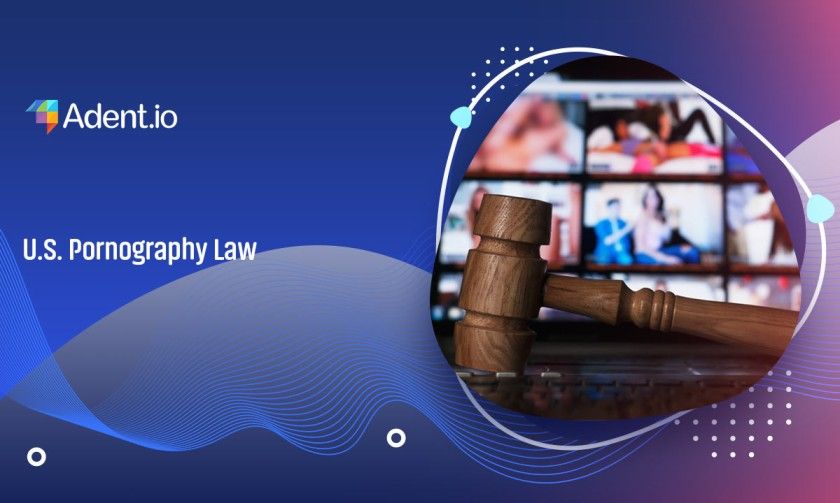Back in 1964, there was a famous court case where a judge couldn’t quite explain what “hard-core pornography” was. He just said he knew it when he saw it.
But times have changed since then, and now we have laws that specifically define what pornography means, especially when it involves minors. And if you’re caught creating, possessing, or distributing illegal porn videos, you’re in big trouble.
The penalties are harsh, and prosecutors really go after people who break these porn laws, sometimes even when they’re not guilty.
If you’re someone who is eager to start a porn site or sell porn videos online, then you must be aware of U.S. porn law. We will provide you with a complete overview of the U.S. pornography laws that will help you make informed decisions regarding your porn business.
What Is Consensual and Non-Consensual Pornography?
Consensual pornography refers to pornography where all parties involved have given enthusiastic consent to participate in the sexual acts depicted.
This is in total opposite to non-consensual pornography, also known as “revenge porn,” which involves the distribution of sexually graphic images of individuals without their consent.
It is important to note that even in consensual pornography, performers may still face stigma and difficulty finding work outside of the industry. Additionally, some pornographic content may feature fantasies or fetishes where consent cannot be confirmed, such as sex with someone who is unconscious or sleeping.
To determine if the pornographic content you are viewing is consensual, you can ask yourself the following questions:
- Did everyone in this video enthusiastically consent to have sex on camera and perform the specific acts depicted?
- Was everyone involved of legal age and able to give informed consent?
- Was everyone involved paid fairly and treated with respect and dignity?
It is important to raise awareness about the issue of non-consensual pornography and to support laws that protect individuals from having their sexually graphic images shared without their consent.
Now that we understand the definition of consent and non-consent regarding pornography, let’s get to know about the U.S. porn laws on adult websites.
A Brief About U.S. Adult Website Law
Nowadays, people are eager to start an adult website because of the possibility of making tens of thousands of dollars within a span of a few months.
However, it is important to note that starting an adult website shouldn’t be done on a whim since the website must adhere to U.S. adult website laws end-to-end. In this section, we will discuss these laws so that you can build your own adult website legally.
1. Age Verification
It is crucial for operators or owners of adult websites to take necessary measures to ensure that performers are of legal age 18 years or older in the United States.
The federal regulations instruct that performers appearing in sexually explicit content must provide a government-issued form of identification, and it is the responsibility of all porn producers to maintain records associated with the performer.
2. Model Releases
It is important to obtain model releases for individuals featured in adult content and keep them separate from age records.
These model releases should be drafted by a knowledgeable adult website lawyer, and should address various legal issues such as right of publicity, invasion of privacy, consent, sexually transmitted infections, harassment, condom usage, and character/persona rights.
3. Intellectual Property
Intellectual property is a crucial aspect of operating an adult website. Adult website operators should identify, register, and enforce their intellectual property rights, including trademark, copyright, and DMCA safe harbor.
Trademark concerns should be evaluated before selecting a brand name or website domain, and if eligible, a trademark application should be submitted to the U.S. Patent and Trademark Office to protect the site’s brand name and/or logo.
Copyright registration is also important when producing and uploading porn videos on adult websites.
4. Obscenity
Obscenity laws in the United States are concerned with prohibiting lewd, filthy, or disgusting words or pictures.
The First Amendment does not protect obscene material, but indecent materials or depictions, normally speech or artistic expressions, may be restricted in terms of time, place, and manner but are still protected by the First Amendment.
5. Child Pornography
Child pornography is illegal under federal law and in all states in the United States. It is punishable by up to life imprisonment and fines of up to $250,000.
Federal law defines child pornography as any visual depiction of sexually explicit conduct involving a minor (someone under 18 years of age). This includes photographs, videos, digital or computer-generated images indistinguishable from an actual minor, and images created, adapted, or modified but appear to depict an identifiable, actual minor.
So whether you sell nudes or porn videos on your adult website, be sure that the performers are all in legal age.
6. Prostitution
Prostitution is illegal in the vast majority of the United States, regulated by state laws rather than federal laws. In both California and New Hampshire, it is legal to pay an adult to act in an adult video production.
But in other states, the prostitution law may be legal in some counties, but most of the time, it is considered illegal. So if you’re considering selling homemade porn videos that a prostitute performed, then make sure to check your state law.
7. Porn Production & Distribution
The laws regulating pornography production and distribution vary by state.
Some areas of legal concern regarding adult pornography are: prohibiting certain or all types of pornography that are illegal within a government’s jurisdiction, preventing those under the legal age (for most, this means a minor under 18) from accessing pornographic content, and enforcing laws designed to ensure that performers in pornography are of legal age.
It is important to note that due to the international nature of the internet, internet pornography carries with it special issues with regard to the law. Only the laws of one’s home state apply with regard to distributing or possessing internet pornography.
Important Regulations in the Porn Industry
If one wants to start a porn business, he/she also needs to understand the laws that govern adult websites as well as the rules and regulations of the porn industry.
1. Violence Against Women
Porn violence against women was reported to occur as low as 1.9% of the time in older studies, but in recent years, 87% of violent scenes included physical aggression, such as slapping or choking, while 48.7% involved verbal aggression, such as being called a “bitch” or other demeaning words.
As a result of these facts, it is argued that violence against women is prominently featured in porn and does have a significant impact on society.
Ensure you tell the performers what you intend to do in your porn video and don’t force them if they’re uncomfortable; otherwise, you may face legal consequences.
2. Racially Discriminatory Hiring Practices
Actors in the adult entertainment industry report that race plays a significant role in hiring decisions and compensation disparities.
Black actors are paid up to half as much as their white colleagues, which is in violation of Title VII of the Civil Rights Act of 1964. Employers are prohibited from making hiring decisions based on race or paying employees of different races differently. It is important to ensure that actors are hired without discrimination based on race or color.
3. Sexual Safety & OSHA
The adult film industry has unique health and safety concerns due to the nature of the work. The use of condoms in porn production has been a topic of debate and regulation.
In California, Cal/OSHA requires employers in the adult film industry to provide and ensure the use of condoms and implement other measures to protect employees from sexually transmitted infections.
Also, adult performers in the mainstream porn industry are often required to undergo testing every 14 days for a range of STIs, including HIV, syphilis, gonorrhea, chlamydia, hepatitis B and C, and trichomoniasis.
Conclusion
U.S. pornography laws are applied no matter how you produce, possess, and distribute sexually explicit material. All those involved in creating pornography should adhere to these laws, and if they break them, they may face federal punishment, and in cases of illegal or child pornography, they may be imprisoned.
So before you plan to start an adult website, ensure to understand all the laws and regulations of pornography in your state.
P.S. If you’re looking to start a porn site at a cost-effective price, we suggest xStreamer by Adent.io. xStreamer is an adult tube site script that helps you build porn sites like Pornhub and YouPorn with all the money-making features you need. So check it out!
Hi
Start Your Own Adult Affiliate Tube Site
Nathan
Head of Technical Support at Adent.io
Nathan leads Adent.io’s Technical Support team with a commitment to excellence, ensuring clients receive the help they need to succeed with their adult website platforms. A graduate of Chulalongkorn University with years of experience in technical support, Nathan combines his education with a deep understanding of Adent.io’s ready-made adult scripts, providing responsive, reliable assistance tailored to each client’s needs.

 and Welcome to Adent.io
and Welcome to Adent.io





